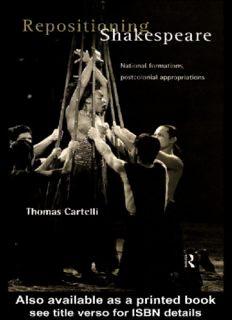
Repositioning Shakespeare: National Formations, Postcolonial Appropriations (Routledge Research in Shakespe) PDF
Preview Repositioning Shakespeare: National Formations, Postcolonial Appropriations (Routledge Research in Shakespe)
REPOSITIONING SHAKESPEARE Repositioning Shakespeare offers a far-reaching assessment of how the Bard has been appropriated within postcolonial contexts, especially in the United States. Thomas Cartelli explores how Shakespeare is repositioned as postcolonial cultures seek to renegotiate Shakespeare’s standing as a privileged site of authority within their own national formations. Cartelli provides innovative readings of texts and events that position themselves in relation to Shakespeare, such as: • polemical essays by Walt Whitman • the nineteenth-century play, Jack Cade, commissioned and staged by the first major American Shakespearean actor • an essay on labor-management reform by social activist Jane Addams • novels by Aphra Behn, Ngugi wa Thiong’o, Michelle Cliff, Tayeb Salih, Nadine Gordimer, a nd Robert Stone • the 1849 Astor Place Riot • films by James Ivory and Gus Van Sant • a Shakespeare tercentenary masque performed on the campus of the City College of New York in 1916. Repositioning Shakespeare makes an original contribution to debates about the cultural uses of Shakespeare, as well as to the question of what counts as postcolonial. Thomas Cartelli is Professor of English at Muhlenberg College. He is the author of Marlowe, Shakespeare, and the Economy of Theatrical Experience, which was awarded the 1991 Hoffman Prize for Distinguished Publication on Christopher Marlowe. REPOSITIONING SHAKESPEARE National formations, postcolonial appropriations Thomas Cartelli London and New York First published 1999 by Routledge 11 New Fetter Lane, London EC4P 4EE Simultaneously published in the USA and Canada by Routledge 29 West 35th Street, New York, NY 10001 This edition published in the Taylor & Francis e-Library, 2001. © 1999 Thomas Cartelli All rights reserved. No part of this book may be reprinted or reproduced or utilized in any form or by any electronic, mechanical, or other means, now known or hereafter invented, including photocopying and recording, or in any information storage or retrieval system, without permission in writing from the publishers. British Library Cataloguing in Publication Data A catalogue record for this book is available from the British Library Library of Congress Cataloging in Publication Data A catalogue record for this book has been requested ISBN 0-415-19134-3 (hbk) ISBN 0-415-19498-9 (pbk) ISBN 0-203-02565-2 Master e-book ISBN ISBN 0-203-17384-8 (Glassbook Format) TO MY MOTHER AND IN MEMORY OF MY FATHER CONTENTS Acknowledgments ix Introduction 1 PART I Democratic vistas 25 1 Nativism, nationalism, and the common man in American constructions of Shakespeare 27 2 Shakespeare at Hull House: Jane Addams’s “A Modern Lear” and the 1894 Pullman Strike 46 3 Shakespeare, 1916: Caliban by the Yellow Sands and the new dramas of democracy 63 PART II Prospero’s books 85 4 Prospero in Africa: The Tempest as colonialist text and pretext 87 5 After The Tempest: Shakespeare, postcoloniality, and Michelle Cliff’s new, New World Miranda 105 PART III The Othello complex 121 6 Enslaving the Moor: Othello, Oroonoko, and the recuperation of intractability 123 vii CONTENTS 7 “Like Othello”: Tayeb Salih’s Season of Migration and postcolonial self-fashioning 147 Conclusion—Decolonizing Shakespeare: My Son’s Story, Children of Light, and late imperial romance 169 Notes 181 Works cited 213 Index 225 viii ACKNOWLEDGMENTS This book had its start in the essay, “Prospero in Africa,” that was first published in 1987 in Shakespeare Reproduced and is reprinted in revised form here. An opportunity to build upon this piece was provided when the Shakespeare Association of America invited me to deliver a paper on Shakespeare and postcolonialism at its annual meeting in Kansas City in 1992. The result, “After The Tempest: Shakespeare, Postcoloniality, and Michelle Cliff’s New, New World Miranda,” was later revised for publication in Contemporary Literature, Volume 36, No. 1 (1995), and has been once more revised for inclusion here as a companion-piece to “Prospero in Africa.” It appears by permission of the University of Wisconsin Press and the Board of Regents of the University of Wisconsin System. I might never have heard of Michelle Cliff were it not for my long-time friend and colleague, Jim Bloom. Jim later successively acquainted me with Percy MacKaye’s Caliban by the Yellow Sands, Jane Addams’s “A Modern Lear,” and Robert Stone’s Children of Light, while adding immeasurably to my understanding of N adine Gordimer’s My Son’s Story. Jim also offered to read the entire manuscript, which he did with his usual impatience for slack thinking and pretentiousness. I owe him the store. An early version of Chapter 1 was presented at the 1994 annual meeting of the SAA in Albuquerque in a session on “Shakespeare and Democracy” which I organized with Michael Bristol. The chapter on Othello and Oroonoko owes mightily to earlier work done on these texts by Margie Ferguson among others, and not a little to the resources of the Folger Library. The subject of Chapter 7, Tayeb Salih’s Season of Migration to the North, was first brought to my attention by Michael Neill during our own season together at the Folger, though my primary debt here is to Jyotsna Singh, whose essay on the novel helped show me what more might be done with it. ix
Description: